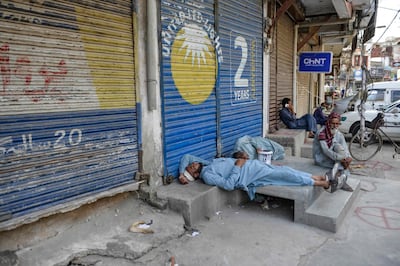The family of eight-year-old Zohra Shah have broken their silence about her grisly murder in Pakistan, calling for justice after she was allegedly killed by her employer for releasing expensive parrots from their cage.
The murder of the domestic child worker in Rawalpindi, Pakistan’s fourth-largest city, has stirred debate on social media in the south Asian country, with many calling for stricter legislation to protect domestic workers across the country.
Shah was one of an estimated 8.5 million child workers in Pakistan, according to the International Labour Organisation (ILO), and the latest victim of the torture and murder of domestic child workers caused by an absence of strict laws safeguarding them.
"We belong to a poor family and need justice. My granddaughter was brutally murdered with a heavy wooden object and there were deep injuries on her face and body," Zohra Shah's grandfather Fazal Hussain said in an interview with The National, the first given by her family.
“We have been offered money [Dh27,000] by the relatives of Hassan Siddiqui, who raped her several times when she was living with them for the past four months. I denied the offer, we need justice not money,” he said on Tuesday from his village of Basti Maso Shah in the Muzaffargarh district of Southern Punjab.
He claims she was sent to their house by a relative, her aunt, without the family’s permission.
"I have six children, Zohra Shah was the third among the siblings. I cannot forget her tortured face and body. The cruel people have killed my innocent daughter merely over birds," Samina Shah, the mother of Zohra Shah, told The National.
Hassan Siddiqui and his wife Umme Kulsoom remain in police custody in Rawalpindi and police will present their confession in court on June 22 after which they will be sentenced. The maximum sentence for murder in Pakistan is death.
Rights activists have urged the government to introduce strict legislation to control the deteriorating issue of child labour. Shah succumbed to her injuries on May 31 with signs of physical torture on her body.
Pakistan, a country of 220 million people, still has little clarity on the working-age of children. It varies in different laws, yet remains under 14 years of age, according to the constitution of Pakistan, despite officials and activists saying the standard working age internationally is 18-years-old, and that Pakistan should adopt it.
"Unfortunately, there is no clear law on child labour in the country and unless the proper age of work, for example, 18 years of age, is implemented, then the prohibition of employment seems an uphill task," Rabiya Javeri Agha, federal secretary in Human Rights ministry, told The National.
“Child labour laws should be revisited to protect millions of child workers; we have become used to a culture of abuse at home, in schools and in society at large. There is too much violence and too little tolerance around us,” she said.

Faryal Makhdoom, the wife of British-Pakistani boxer Amir Khan announced that she will financially help the family of Zohra Shah. “Amir and I have personally contacted Zohra's father and hoping to speak to him shortly. Thank you to everyone... especially the lawyers, barristers and human rights activists who are supporting us,” she wrote on her Instagram page.
"Loads of messages asking why they sent their 8-year-old daughter to work... they didn't. The father has told us he has 6 kids... the father sent the daughter (Zohra) to Islamabad with her Khala [aunty] to study there. The Khala then put Zohra Shah to work... where she was beaten to death."
Activists have urged Pakistan’s government to implement policies to protect vulnerable domestic child workers. There remains a lack of official data on the issue, they say, as Pakistan has not conducted its child labour surveys since 1996.
Iftikhar Mubarik, executive director of the Search for Justice children advocacy network, told The National: "Data gathered by the Child Rights Movement, an alliance of over 25 NGOs working on child rights across Pakistan, shows that from 2010 there were 60 murders of domestic child workers reported in the country and hundreds of cases of abuse were separately reported."
These domestic workers in Pakistan lie outside of any legal framework, except for legislation passed last year by the Punjab government, which still has many loopholes that fail to protect vulnerable domestic child workers.
A significant portion of the domestic workers are part of an informal economy that lies outside labour laws leading to the worst exploitation. A majority are women and children who are hired by middlemen in unofficial agreements.
A study conducted in 2011 reported that a majority of domestic child workers were children between 10 and 14 years of age, of whom a majority were girls. Lacking access to education, these girls worked for up to 15 hours a day for very low pay. The nature of work comprised a range of activities including cooking, washing dishes, cleaning the house, ironing and babysitting.
Sajjad Cheema, executive director of Pakistani NGO Society for the Protection of the Rights of the Child, estimates there are about 12 million child workers in the country, which means in every third household there exists a young worker.
"The cases were always registered but we have not witnessed any punishment for the perpetrators except Tayyaba abuse case," Cheema told The National, referring to a 10-year-old maid who in 2016 was tortured by her employers, judge Raja Khurram Ali and his wife Maheen Zafar. "There is a need to change the mindset."
However, under Pakistani law, the family of the victim has the right to forgive the criminals even in serious crimes such as murder.
They have to admit, before the court, that they forgive the criminal in the "name of God" and the victim's families usually get blood money in compensation. These laws have been frequently used to settle disputes out of the courts.
But, for Shah’s family, such blood money would offer little justice.


